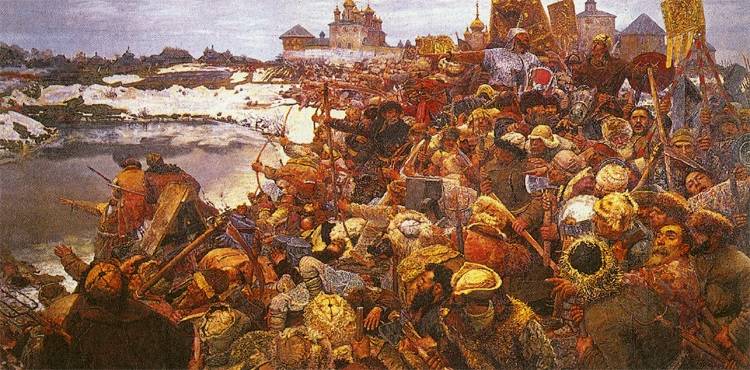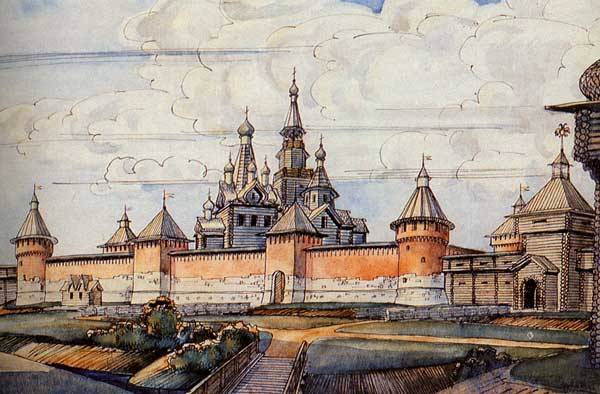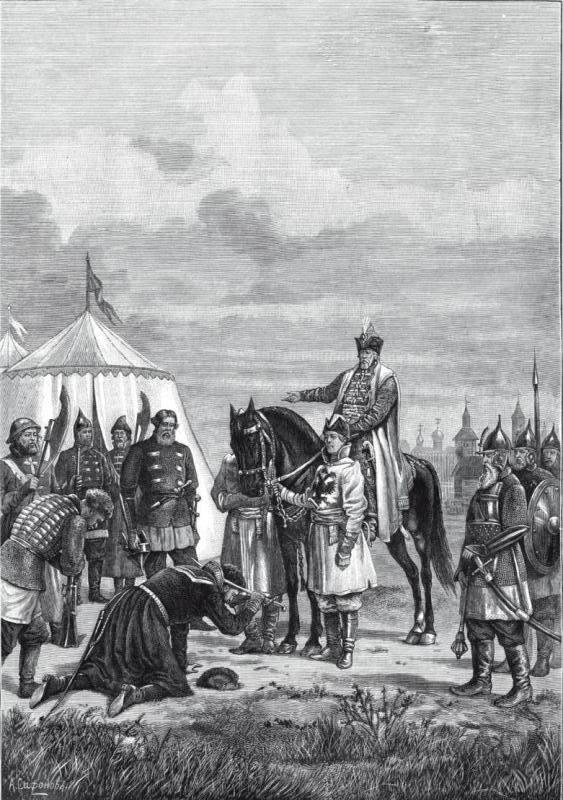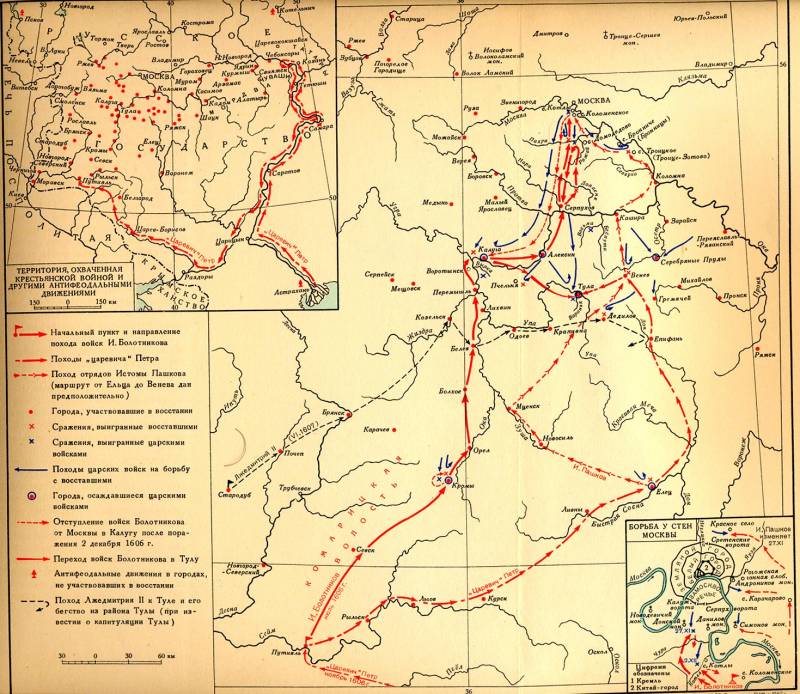Bolotnikov against Shuisky. Battles for Moscow, Kaluga and Tula

G.N. Gorelov. Bolotnikov Uprising
Despite the suppression of the Bolotnikov uprising and the death of its leaders, the turmoil did not stop. The surviving "thieves" joined the army of False Dmitry II and took part in a new campaign against Moscow.
The Siege of Moscow
Almost immediately, as the insurgent army besieged Moscow in early November 1606, a split arose in the camp of the Bolotnikovites. Voivode Pashkov achieved great success in the course of hostilities and wanted to retain the main command. But Bolotnikov presented the letter of the “great governor”, which was issued by “Tsar Dmitry” himself. Not having achieved the support of the majority of "field commanders", Pashkov with 500 nobles left Kolomenskoye and went to Kotly.
Shuisky's position at that moment was critical. The active army was lost, reinforcements had not yet arrived. The treasury was empty. With the loss of the southern counties, the supply of cheap bread to the capital stopped. There was a strong boyar opposition to the power of Tsar Vasily. The people murmured and worried, which was promoted by the enemies of the Shuisky and the supporters of False Dmitry.
Pashkov began negotiations with the boyars, offered to extradite the Shuisky, who were guilty of a rebellion against the "legitimate king." However, Shuisky was able to retain power and avoid a popular uprising. He convinced the people that if the Bolotnikovites succeeded, they would punish the Muscovites for the murder of False Dmitry.
The tsar invited the devoted townspeople and sent them as ambassadors to Bolotnikov's camp. The move was very successful. Representatives of the posad promised to surrender the capital city without a fight if they were shown "the escaped Dmitry". Bolotnikov believed the messengers and sent messengers to Putivl with a request to expedite the arrival of "Dmitry" to the Russian state. However, no Dmitry existed.
As a result, Bolotnikov's army (instead of decisive actions to siege the capital and attempts to cause an uprising in the city) hesitated. Waited for the arrival of the "king". At this time, Shuisky's supporters acted. They bought time and waited for the arrival of reinforcements.
The envoys (who arrived in Bolotnikov's camp) scouted the forces, established contacts with the disaffected (primarily with the nobles). Such outstanding leaders of the rebels as Lyapunov, despite their hatred of Shuisky, began to think about reconciliation with him. The elements of the people frightened them.
The church helped to find a way of "correction". Patriarch Hermogenes frightened the "best people" that the "thugs" would beat them, divide among themselves their goods, their wives and children. Taking into account the great authority of Lyapunov among the rebels, Tsar Vasily decided to grant him the rank of Duma nobleman.
"The thieves were beaten"
In mid-November, the Bolotnikovites tried to launch an offensive against Moscow from the south. Shuisky's government was notified of this attack and prepared. At the height of the battle, the Lyapunov with 500 horse Ryazan nobles went over to the side of Shuisky. The governors Pashkov and Sumbulov, many noblemen, went over to the side of Tsar Vasily.
The rebels had to retreat. True, Bolotnikov's army did not weaken. The influx of new detachments into his camp did not stop. Tens of thousands of armed people were under the banner of "Dmitry". The wave of the uprising swept the southern part of Russia - from the western borders to the Middle and Lower Volga regions.
A week and a half after the unsuccessful attack, Bolotnikov sent a detachment to Krasnoe Selo, in order to then completely blockade the capital. But Shuisky was informed about this in time. The rebels were met by government troops and driven back to Kolomenskoye. At the end of November, a detachment of Smolensk militias arrived in Moscow. Now Shuisky's government had the strength for a decisive battle. The tsar subordinated all the regiments to his nephew, the young Skopin, who had already shown his leadership talent and loyalty to the throne.
In early December 1606 Skopin-Shuisky attacked the enemy near the village of Kotly. The transition of servicemen from the Bolotnikov army to the side of the government forces in the midst of the battle decided the outcome of the battle. Skopin-Shuisky won and
The rebels again retreated to Kolomenskoye and fortified there. Tsarist governors brought up artillery and began shelling Bolotnikov's camp. For three days the tsarist troops fired at the Bolotnikovites and on the fourth day they occupied Kolomenskoye.
Bolotnikov himself with personal security was able to break through the encirclement and fled to Kaluga. Shuisky brutally dealt with the captured "thieves". Every night, hundreds of them were taken to the Moskva River, beaten on the head with clubs and lowered under the ice.
Siege of Kaluga
The defeat of Bolotnikov's army near Moscow did not lead to an end to the turmoil. In Kaluga, new forces gathered around Bolotnikov. The city was prepared for the siege. The ditches were cleaned, the stockade on the shaft was renewed. The royal regiments under the command of Dmitry Shuisky (the king's brother) tried to take the fortress on the move.
Bolotnikovites put up fierce resistance in a two-day battle on December 11-12, the attack failed. The siege began. The rebels repeatedly made bold forays, inflicting damage on government troops. Reinforcements arrived from Moscow under the command of Ivan Shuisky (the younger brother of Tsar Vasily), brought a heavy "outfit" (artillery). Cannons fired at the city day and night.
The tsarist warriors filled up the moat and brought to the walls "signs" of brushwood and firewood. The rebels were able to dig a gallery underground and blew up the "omen" with the soldiers on it. The strongest explosion caused a commotion in the Shuisky camp. A powerful sortie from the fortress completed the victory of the rebels. The tsarist troops retreated again.
"Tsarevich Peter"
During the life of False Dmitry I, another impostor appeared - "Tsarevich Peter". Cossack Ileiko Muromets (Ilya Korovin) posed as Tsarevich Peter Fedorovich, who in reality never existed the son of Tsar Fedor I Ivanovich.
Volga and Terek Cossacks supported the "thieves' prince" to give their actions the appearance of legality. Rebel forces in the Lower Volga region united around him. Having learned about the death of "Dmitry", the False Peter took refuge with the Don Cossacks. The news of Bolotnikov's uprising caused a new movement of the "Tsarevich" detachment. He brought about 4 thousand soldiers to Putivl. The Cossacks, taking advantage of the fact that there was real power on their side, practically seized power in the city. Prince Grigory Shakhovsky had to cede power to the "tsarevich".
The false Peter was by birth a simple man and did not attract the "tsarevich". Therefore, the terror soon began against all those who "doubt" his origin. Those nobles who were held in custody for trial by "Dmitry" were brutally executed in the name of "true" Peter.
Sources reported that
Also, the "thief Petrushka" arranged "bear fun": the prisoners were poisoned in the fence with bears, or, sewn into bear skins, dogs were lowered on them.
Dealing with the noble opponents, Ileyka simultaneously surrounded himself with noble people loyal to him and formed his Boyar Duma. He handed out awards and lands. The nobles led the rebel detachments.
True, the real power was in the Cossack circle. The impostor tried to establish an alliance with the Commonwealth. The Polish king Sigismund was in no hurry to get involved in an adventure. However, Ivan Storovsky appeared in the Putivl camp with Lithuanian military men. The formation of Polish companies to help the rebel army began. From Putivl "tsarevich" Peter moved to Tula.
At this time, Vasily Shuisky tried to change the mood of the people (primarily Muscovites) in his favor. The ashes of Dmitry Uglitsky were again disturbed to prove his death. Then they disturbed the bodies of the dead Godunovs. The capital paid off the debt to the lost dynasty. The deposed Job was summoned to the capital.
Two patriarchs and the Holy Council had to prove the legality of the election of Tsar Basil. Job implored the people of the capital not to violate their loyalty to the new autocrat. To win over the landowners to his side, Shuisky issued a decree on the search for fugitive serfs under 15 years old. The tsarist government tried to weaken the ranks of the rebels and at the bottom. "Voluntary" slaves, whom the gentlemen enslaved by force, were promised freedom.

Reconstruction of the Tula Kremlin (XVI century).
Tula siege
The royal army under the command of Vorotynsky was sent to Tula to capture the impostor. But an insurgent army led by Telyatevsky stood in her way. Ironically, Prince Andrei Telyatevsky was previously the owner of Bolotnikov.
Telyatevsky defeated Vorotynsky in March 1607 near Tula. Then he moved to Kaluga and on the way to it met with a strong tsarist army under the command of the governors of Tatev, Cherkassky, Baryatinsky and Pashkov. This army also included the broken regiments of Vorotynsky.
In the stubborn battle on Pchelna, which took place in early May 1607, the government troops were utterly defeated. Many soldiers were killed, taken prisoner, or went over to the side of the Bolotnikovites. The princes Tatev and Cherkassky were killed.
This defeat completely demoralized the Shuiskys' army near Kaluga. Bolotnikov's troops made a powerful sortie. And the tsarist troops fled. The rebels captured all the artillery, the reserves of the tsarist army. Many warriors went over to the side of the rebels.
After this victory, Bolotnikov moved to Tula and again tried to launch an offensive against Moscow. The tsarist government sent a new army against the rebels. It was headed by the king personally. It included the regiments of Skopin, Urusov, Ivan Shuisky, Golitsyn and Lyapunov.
On the river Vos'ma near Kashira, on June 5-7, 1607, the Bolotnikovites began to press the flank of the tsarist army. However, one of the rebel detachments went over to the side of the tsarist troops. And Lyapunov's Ryazanites went into the rear of the rebels. Panic broke out in the rebel forces. And they fled back to Tula. Many of the captives were executed.
On June 12, 1607, the advanced regiments of the tsarist army under the command of Skopin-Shuisky reached Tula. At the end of the month, Tsar Vasily arrived with the main forces and artillery.
The Tsar's army consisted of 30-40 thousand soldiers. Bolotnikov and Lzhepetr had about 20 thousand people.
The fortifications of Tula were powerful, and the Bolotnikovites stubbornly and bravely defended themselves. They made sorties, repulsed all the attacks. The siege dragged on until October.
To force the besieged to lay down weapon, the royal forces built a dam on the Upa River, which flowed through the city. The autumn flood led to the flooding of Tula. Stocks have died. Diseases and hunger began in the city. Confusion began among the boyars. Many were ready to open the gates and betray Bolotnikov and the "Tsarevich" in order to save their lives.
They sent ambassadors to Shuisky -
Bolotnikov urged people to hold on. He repeatedly called on "Dmitry" to come to the rescue, but without success.
Bolotnikov was forced to admit that he could not say for sure whether the real or imaginary tsar is the person to whom he swore allegiance in Sambir.
Meanwhile, False Dmitry II finally appeared in Russia and defeated the camp in Starodub. In September, his army began to move, occupying Pochep, Bryansk and Belev.
In October, the advance detachments of the impostor captured Epifan, Dedilov and Krapivna, reached the approaches to Tula, but it was too late. The situation in Tula became more and more desperate. Death mowed down warriors and common people.
Seeing that the situation was hopeless, Bolotnikov and the "Tsarevich" themselves began negotiations with Tsar Vasily, offering him to surrender the Tula Kremlin in exchange for saving life, otherwise threatening that the siege would drag on as long as at least one person was alive.
Shuisky made a promise. On October 10 (20), 1607, Tula capitulated.
Most of the ordinary "Tula inmates" were pardoned and dismissed to their homes. But some of the rebels were detained and sent to prison in different cities. Bolotnikov and Ileyka were taken to Moscow, where they were interrogated. The "thieves' prince" was executed in Moscow. Ivan Bolotnikov was exiled to Kargopol (a town in the Russian North), where he was blinded and drowned.
Despite the suppression of the Bolotnikov uprising and the death of its leaders, the turmoil did not stop.
The surviving "thieves" joined the army of False Dmitry II and took part in a new campaign against Moscow.

Bolotnikov surrenders to Shuisky. A. Safonov

Information